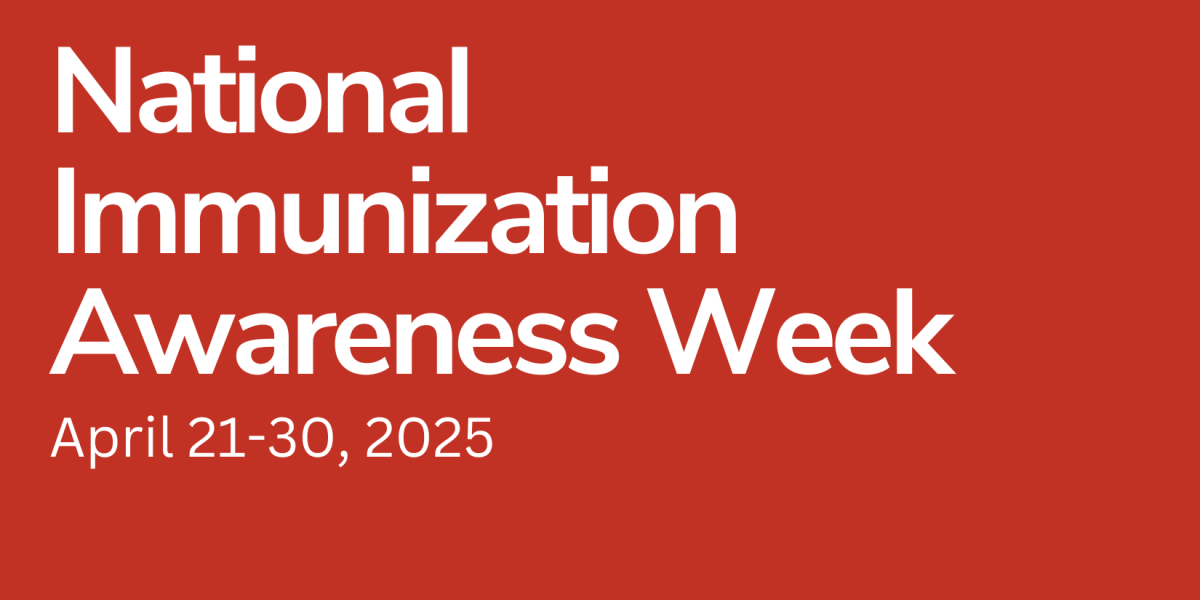National Immunization Awareness Week (April 21-30, 2025) is a great opportunity to reflect on the essential role vaccines play in our individual and collective health and to ensure that we’re all up to date.
Vaccines have made an incredible impact on public health, both here in Ontario and around the world. Just a few generations ago, diseases like polio, measles, and meningitis caused severe illness, long-term disability, and even death. Thanks to immunizations, these outcomes have become far less common and in some cases, nearly eliminated.
This year’s theme – “Don’t let history repeat itself. Protect your future. Get immunized.” – is an important reminder. The progress we’ve made through vaccination cannot be taken for granted. Without immunizations, we could see a return of serious diseases that we now have the tools to prevent. Staying up to date with recommended vaccines helps maintain the protection we’ve worked so hard to build.
Why Immunizations Matter
Vaccines help our immune systems recognize and fight infections before they cause serious harm. They protect not just those who receive them, but also those around them by reducing the spread of disease.
When the majority of people in a community are immunized, it becomes much harder for infections to spread. This concept – known as community immunity – helps protect infants who are too young to receive certain vaccines, people with weakened immune systems, and individuals who cannot be vaccinated due to medical conditions
By keeping up with immunizations, we help protect those around us – especially the most vulnerable.
Childhood Immunizations
Vaccinating children on time is one of the most effective ways to protect them from serious, potentially life-threatening illnesses. In Ontario, routine childhood vaccines are publicly funded (free) and protect against diseases such as diphtheria, tetanus, whooping cough (pertussis), polio, measles, mumps, rubella, meningococcal and pneumococcal infections, chickenpox (varicella), hepatitis B, and rotavirus.
These vaccines are most effective when given according to schedule, helping protect children during their early, most vulnerable years. They also reduce the chance of outbreaks in schools, childcare centres, and the wider community.
In Ontario, the Immunization of School Pupils Act (ISPA) requires students to be vaccinated or have a valid exemption to attend school. Students without the required vaccinations can be suspended from school.
In recent years, vaccine coverage among children in some areas of Ontario has declined, and as a result, cases of preventable diseases (e.g., measles) have started to rise. These infections can spread quickly, especially where immunization rates are low.
We understand that some parents/guardians may have questions or concerns about vaccines. It’s okay to ask. Speaking with a trusted healthcare provider, such as your family doctor, nurse practitioner, or local public health nurse, can help you get the facts and make informed decisions. They’re there to support you with clear, evidence-based information.
Keeping your child’s immunizations up to date is a simple but powerful way to protect their health and the health of others around them.
Adult Immunizations
Vaccines continue to be important throughout life. As we age, immunity can fade, and new vaccines may be introduced based on updated research and changing health needs. Staying current with recommended vaccines helps protect against serious illness and reduces the risk of spreading infections to others.
In Ontario, several vaccines are publicly funded for eligible adults. These include vaccines that help protect against influenza, COVID-19, shingles, pneumococcal disease, and tetanus, diphtheria, and pertussis. Some vaccines are also recommended during pregnancy or for people with certain medical conditions.
Your immunization needs may depend on your age, health status, job, or travel plans.
What You Can Do
This National Immunization Awareness Week, take a few moments to check your family’s vaccination records. Are you and your loved ones up to date?
Many vaccines are available at no cost to eligible residents of Ontario. The Thunder Bay District Health Unit (TBDHU) can help you find out which ones you may need and how to access them. To contact the local TBDHU office, call 807-229-1820.
Vaccines are one of the safest and most effective tools we have to protect ourselves, our families, and our communities. If you’re uncertain or have concerns, talk to your healthcare provider – they’re there to support you.
To learn more about recommended vaccines, visit the TBDHU’s website.
Let’s keep our communities healthy – one immunization at a time.



